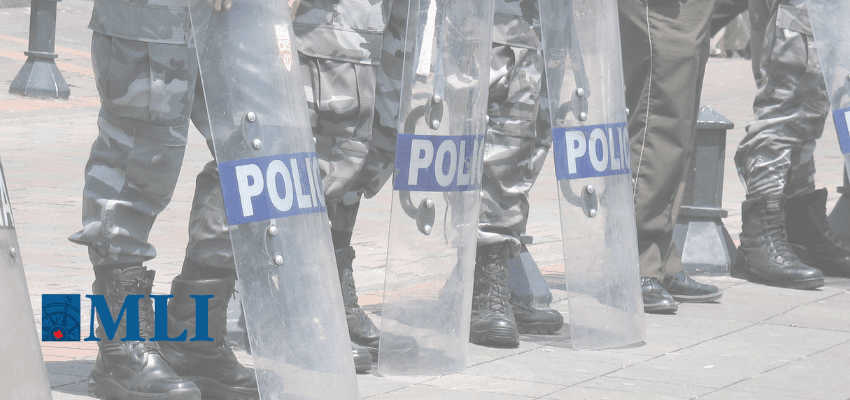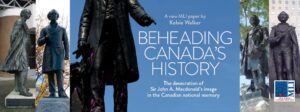By Kelsie Walker, June 11, 2024
Following widespread pro-Palestinian protest encampments popping up on American campuses, there was an influx of copycat encampments across major Canadian university campuses, including at the University of Toronto, McGill University, the University of British Columbia, the University of Calgary, the University of Ottawa, and Western University, among others. These encampments are demanding that universities divest from entities associated with Israel, accusing them of supporting apartheid and being complicit in genocide. The protests, intended to express solidarity with Palestinians but also rife with antisemitism and calls for violence against Jews, have sparked intense debates about the limits of free speech and the legal boundaries of protests on campuses.
What began as a story of peaceful activism has quickly turned into lawmakers, universities, and the police selectively enforcing the law on partisan lines, displaying both hypocrisy and inaction when it comes to handling protests associated with the left.
A new poll from the Angus Reid Institute found that two-thirds of Canadians (64 per cent) say the police give preferential treatment to certain groups when dealing with protests. Canadians of all political affiliations largely feel that police response and engagement at protests is not applied consistently, with three-in-five past Conservative (68 percent), Liberal (60 percent), and NDP (73 percent) voters saying so. While they differ on the question of who receives preference, given the recent events at Canadian universities, it is undeniable that left-leaning causes, and more specifically, pro-Palestinian protests, are given unfair leeway in comparison to causes deemed to be right-leaning.
While some have tried to frame the campus encampments as an issue of free speech, in many cases, the protesters are breaking clearly defined and communicated laws. Students are certainly free to protest. However, they must also comply with university policies and Canadian laws. Free speech allows individuals to express their opinions, even controversial or unpopular ones. However, when the expression of an opinion crosses into illegal activity, such as vandalism, trespassing, or the incitement of violence, it is no longer protected under the banner of free speech. Yet, pro-Palestinian protestors are demanding that their protests be held above the law, and such demands are being met.
Despite encampments trespassing on private property, and thus being, by all definitions, illegal, they’ve seen practically no disciplinary action. The majority of Canadian universities are either placating protestors’ demands by offering a list of concessions, or, they are simply letting protests proceed practically unchecked. Police did recently disperse the encampment at McGill University on June 6 – but only after protesters there escalated the situation by illegally occupying an administration building. While most protestors have good intentions, illegal and alarming activity is frequently occurring in protest sites. Encampments have, at times, seen physical conflicts with counter-protesters, the presence of anti-Canadian and anti-police slogans, the refusal of numerous orders to leave, have issued calls to incite violence, and in one instance, have even displayed shocking imagery depicting the lynching of Jews.
Consider McGill’s “peaceful” protest. Launched in late April, it quickly turned into a hotbed of intolerance. Protestors rejected the university’s offer of concessions (despite the offer being similar to those that have led to conflict resolution at other universities) and sent masked individuals to follow and harass senior administrators at their homes and offices. The encampment displayed profane graffiti, and even featured a hanging effigy of Israeli Prime Minister Benjamin Netanyahu donning a striped outfit that resembled the uniforms that Jews wore in concentration camps during the Second World War. Are these truly displays of free speech, or something far more sinister?
Many of the encampments are demonstrating a striking intolerance to differing opinions and an unwillingness to reach a compromise with universities, with many protestors refusing to leave until all their demands are met. If the situation was reversed, would a pro-Israeli encampment be met with the same tolerance?
Well, the University of Toronto clearly says no. Recently, a pro-Israel encampment, created in counter-protest to the pro-Palestinian encampment on campus, was removed by campus security within minutes of being established. The justification? Unlike the fully fenced-in and untouchable “Little Gaza” that has existed and grown steadily on the campus for over a month, the counter-protest was simply small enough to remove. So, it turns out, universities are in fact able to remove encampments, but only when they are on the wrong ideological side (or, in this case, the “right” side). This double standard is alarming. Why are universities and the police so afraid to stand up to left-wing protests when they blatantly break the law? If encouraging “free speech” is the justification, then that very speech cannot be encouraged selectively.
While encampments at the University of Calgary and the University of Alberta have been disbanded by police, most Canadian universities are not taking any action against illegal encampments. Indeed, some universities have reassured protesters that there will be no punitive actions taken towards them. The University of Toronto, the same university that was so quick to remove pro-Israeli protestors, even began its convocation ceremonies to the backdrop of a large pro-Palestinian encampment.
To be clear, I am not advocating for the forced end of protests. However, the inconsistent application of the law is troubling. This is part of a much wider issue in Canadian society, where there is a clear double standard on this issue. Just look at how the federal government reacted to the “Freedom Convoy” that gridlocked Ottawa in January 2022. In response to the anti-vaccine-mandate protest, the Trudeau government invoked the Emergencies Act and forcibly brought it to an end. Some Freedom Convoy organizers were arrested and their bank accounts frozen. A federal court ruling later declared the use of the Emergencies Act “unreasonable” and a violation of the protesters’ Charter rights.
Ironically, the same people who applauded the crackdown on the Freedom Convoy protesters are crying foul at the very thought of the police disbanding left-wing protest encampments on university campuses. As Sir Winston Churchill once said, “Everyone is in favour of free speech. Hardly a day passes without its being extolled, but some people’s idea of it is that they are free to say what they like, but if anyone says anything back, that is an outrage.”
While free speech is protected, it is not without limits. And it certainly shouldn’t be used as a phony justification for inaction, especially pro-Palestinian encampments make other students and staff feel unsafe on campus. The mobs are especially concerning for Jewish students, faculty, and staff who have suffered instances of anti-Semitic rhetoric, harassment, and exclusion on campus. In the face of such blatant anti-Jewish hate, how can they feel safe, respected, and valued by their institutions?
Protests are often intended to create discomfort; however, universities are sitting by idling while atmospheres of hatred and racism are being strengthened with each passing day. It is so severe that some Jewish students in the United States are taking legal action against their universities, under the claims that the institutions are failing to protect them from discrimination and harassment. If such hostility is allowed to continue unchecked, it is only a matter of time until legal battles emerge on Canadian campuses too. Universities are legally and ethically obligated to ensure that all students feel secure and respected, not allow a select few to run rampant all over university rules. There must be a principled, consistent approach to free speech and legal enforcement – one that transcends political affiliations and ensures that the rights and responsibilities of all citizens are respected equally.
Kelsie Walker is a project manager at the Macdonald-Laurier Institute where she primarily assists with the Defending the Marketplace of Ideas project.







